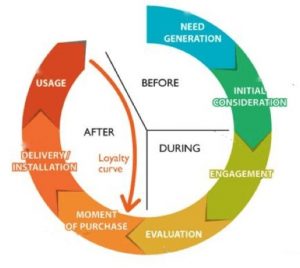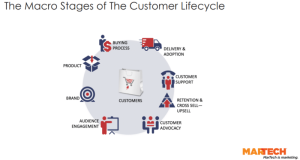 Many enterprise brands and organizations are becoming increasingly challenged by an information problem: too much information, compounded by trouble managing it and delivering it to employees. This typically leaves employees feeling the organization doesn’t offer much information at all, or if they do, that’s it not current or accessible. And whether that perception permeates HR, IT, marketing, sales or customer service, it erodes employee engagement and ultimately, overall business success.
Many enterprise brands and organizations are becoming increasingly challenged by an information problem: too much information, compounded by trouble managing it and delivering it to employees. This typically leaves employees feeling the organization doesn’t offer much information at all, or if they do, that’s it not current or accessible. And whether that perception permeates HR, IT, marketing, sales or customer service, it erodes employee engagement and ultimately, overall business success.
While many organizations have been focusing on investments in customer-facing self-service knowledge initiatives such as a knowledge base capable of projecting consistent searchable information across channels, leading businesses and organizations have also learned to serve their internal customers, their employees, with similar or better offerings. But how does employee self-service knowledge separate the best from the rest? Here are seven key ways:
1. Engagement. A Quantum Workforce 2015 Employee Engagement Trends Report surveying more than 440,000 employees at nearly 5,500 organizations shows that overall employee engagement is at an eight-year low of 65.9%. Employee uncertainty centered around three top items: (1) commitment to valuing employees, (2) benefits and compensation and (3) global information.
Particularly for new employees, the availability, timeliness and accuracy of knowledge is key to their level of engagement. When employees feel connected by and have the information and knowledge they need to immediately learn or begin doing their job, a higher level of engagement is set from the start. What does greater engagement affect?
2. Profitability. The same Quantum Workforce 2015 Employee Engagement Trends Report also shows a direct link between engagement (highlighted above) and profit. In organizations that showed a profit increase, 69% of employees were engaged, compared to 56% employee engagement in organizations where profits decreased. Sales also followed a similar pattern. In organizations where sales increased, 69% of employees were engaged, compared to 57% in organizations where sales decreased.
And knowledge plays a prime role in engagement related to sales. Notes analyst Esteban Kolsky in a recent white paper, sales benefits from employee self-service knowledge by being able to provide prospects with immediate information, whether that’s the latest sales or marketing promotion, new product information, or for existing customers, the status of a service request or upgrade.
“Sales can also use knowledge to maintain and improve sales techniques, methodologies, and even collaborative sales models that are emerging – where knowledge is at the crux of the solution,” he notes. In addition, self-service knowledge can empower sales with subject matter expertise for RFPs without having to email or call various employees across the organization. And that’s just a start to how self-service knowledge can impact profitability, which stems from greater overall…
3. Productivity. The State of Knowledge Management 2014 report from John Ragsdale, the Technology Services Industry Association (TSIA) and Coveo asked participants “If your organization was sharing knowledge as well as they possibly could, how much would it improve the productivity of your team?” Forty percent (40%) said that sharing knowledge well could increase employee productivity by 20 – 30%, and a third of respondents said that a successful enterprise knowledge initiative had the potential of improving productivity 30 – 50%+.
4. Consistency. When different employees and different departments have or provide different answers to the same question, confusion, frustration and mistakes often result. This confusion, frustration and propensity for mistakes is compounded when employees are operating with different information from what the public is given.
In the same TSIA State of Knowledge Management report referenced previously, when participants were asked when asked whether they used the same technology platform for both employee and customer-facing knowledge systems, the greatest majority, 32%, said they use totally separate knowledge technologies, meaning employees see one answer, while the customer or the public sees another.
Siloed knowledge systems, lack of upkeep and lack of use all contribute to the delivery of inconsistent information, making it clear why brands and organizations that invest in not only the introduction, but the maintenance of, a self-service knowledge offering rise to the top.
5. Churn. Notes Kolsky, “Among the leading reasons for employees churning in any job is lack of proper tools. Churn comes from having too many disjointed tools, not having the latest information, or having to hunt for it among different systems, tools, and channels.”
According to IDC’s Unlocking the Hidden Value of information Survey, 44% of the time, most employees can’t find the answers they’re looking for and 61% currently have to access four or more systems when looking for information. This ultimately results in frustration and churn, and increased hiring and training costs for brands and organizations behind when it comes to knowledge management.
6. Culture. Employee self-service knowledge benefits brands and organizations where a company culture initiative or change is underway. Successfully creating or changing a culture, especially around customer experience or new branding, requires top-down adoption. Leading organizations empower all employees with the knowledge they need to get behind the company’s culture.
7. Customer Service. According to the American Express Customer Service Barometer, 99% of consumers surveyed say that getting a satisfactory answer or being connected to someone knowledgeable (98%) are the important prerequisites to a great customer experience. The benefits of customer service agents (and all employees for that matter) being information aware are especially great when it comes to service.
Engagement, profitability, productivity, consistency, churn, culture and customer service. These are seven key factors that anchor any business or organization’s bottom line. Gartner Research VP and Distinguished Analyst, Michael Maoz in his research note Knowledge Management will Transform CRM Customer Service, predicts that by 2018, the rapid creation and retrieval of relevant content (KM) will be a key attribute of leading enterprises. Make sure you are serving your internal customers – your employees – with the knowledge they need.
Business & Finance Articles on Business 2 Community(79)
Report Post





